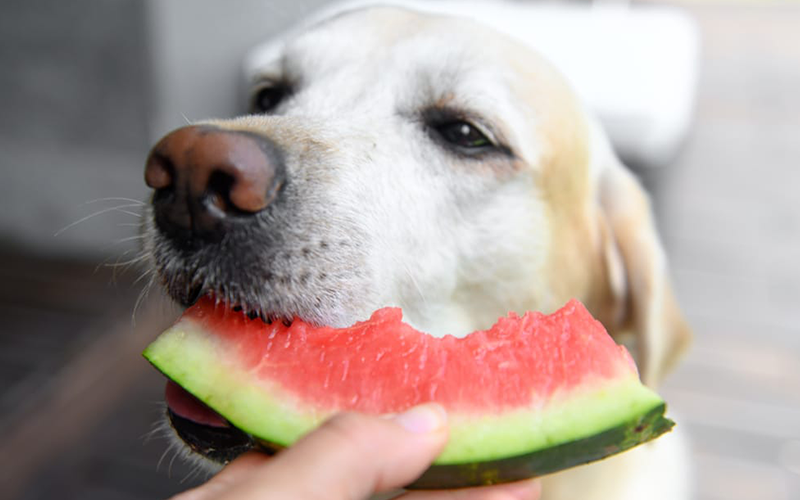Can Dogs Eat Watermelon Rind? A Guide for Pet Owners
- 27 Feb 2025 14:25
Watermelon is a popular summer fruit, and many dog owners enjoy sharing a slice of this refreshing treat with their furry friends. But can dogs eat watermelon rind? While the flesh of the watermelon is generally safe for dogs to consume, the rind is a different story.
In this article, we’ll explore whether dogs can eat watermelon rind, what precautions you should take, and how to safely serve watermelon to your dog.

Can Dogs Eat Watermelon Rind?
Short answer: It’s not recommended.
While watermelon flesh is safe and healthy for most dogs, the rind can pose some risks. While it's not toxic to dogs, there are several reasons why it's best to avoid feeding your dog watermelon rind.
Potential Risks of Feeding Watermelon Rind to Dogs
Choking Hazard:Watermelon rind is tough and fibrous, which can make it difficult for dogs to chew and digest properly. If a dog swallows a large piece of rind without thoroughly chewing it, there’s a choking hazard, particularly for smaller dogs or dogs with fewer teeth.
Digestive Issues:The rind is not as easily digestible as the flesh of the fruit. For dogs that have sensitive stomachs or digestive issues, eating the rind could lead to gastrointestinal distress such as vomiting, diarrhea, or bloating. Additionally, the rind’s tough texture may cause constipation or discomfort when trying to pass it through their system.
Intestinal Blockages:Because of its tough, fibrous texture, watermelon rind can be hard for a dog’s digestive system to break down. In some cases, consuming too much rind can lead to an intestinal blockage, a serious condition that requires veterinary attention.
Possible Pesticide Residue:If you don’t wash the watermelon thoroughly, there could be pesticide residue on the rind. While washing the fruit can help remove some of this residue, it’s still best to avoid feeding the rind altogether, as pesticides can be harmful to your dog.
Benefits of Watermelon Flesh for Dogs
If you’re looking to share watermelon with your dog, it’s important to stick to the flesh of the fruit, which is safe and offers several health benefits:
Hydration:Watermelon is made up of about 92% water, making it a great hydrating snack, especially during hot weather. Proper hydration is vital for your dog’s overall health, and watermelon can help them stay cool and hydrated.
Low in Calories:Watermelon is low in calories and fat, making it a great option for dogs who need to watch their weight. It’s also a healthy, guilt-free treat compared to processed snacks or fatty meats.
Rich in Vitamins:Watermelon is rich in vitamin C, which supports your dog’s immune system. It also contains vitamin A, which promotes healthy skin and eyes, and potassium, which is important for muscle and heart health.
Natural Antioxidants:Watermelon contains lycopene, an antioxidant that can help reduce inflammation and protect cells from damage. Lycopene is particularly beneficial for dogs with skin issues, as it can support healthy skin and coat.
How to Safely Serve Watermelon to Your Dog
If you want to share watermelon with your dog, follow these tips to ensure it’s safe and beneficial:
Remove the Rind:Always remove the rind before giving watermelon to your dog. Only feed them the soft, red flesh, which is safe and easy to digest.
Cut Into Small Pieces:Cut the watermelon flesh into small, manageable pieces to avoid choking hazards. The pieces should be small enough for your dog to chew properly without swallowing too much at once.
Remove Seeds:While watermelon seeds are not toxic to dogs, they can pose a choking hazard or cause digestive issues if consumed in large quantities. Be sure to remove any seeds from the watermelon before offering it to your dog.
Serve in Moderation:While watermelon is a healthy treat, it should still be given in moderation. Too much watermelon can cause an upset stomach or diarrhea, especially if your dog isn’t used to it. Start with small amounts and monitor your dog’s reaction before offering more.
Watch for Allergic Reactions:Although watermelon is generally safe, some dogs may have an allergic reaction to new foods. Watch for signs like itching, hives, or digestive upset. If you notice any adverse effects, discontinue feeding watermelon and consult your vet.
Conclusion: Can Dogs Eat Watermelon Rind?
In summary, no, it’s not recommended to feed your dog watermelon rind. While the flesh of the watermelon is a healthy and hydrating treat for dogs, the rind can be difficult to digest, may cause gastrointestinal issues, and poses a choking hazard. Always remove the rind, seeds, and cut the flesh into small pieces to safely share this refreshing fruit with your dog.
If you're ever unsure about what foods are safe for your dog or need personalized advice, consider using PettureX, a friendly pet health software assistant. PettureX offers 24/7 online consultations to answer all your pet health questions and help guide you in making safe, healthy food choices for your dog.
Related

Crunchy Curiosity: Can Dogs Safely Snack on Pork Rinds? A Deep Dive
- 21 Apr 2025
Pomegranate Seeds and Pooches: A Deep Dive into Whether Dogs Can Safely Indulge
- 21 Apr 2025
Can Dogs Eat Peaches? Vet Explains Benefits, Cyanide Risks & Safe Serving
- 16 Apr 2025
Can Dogs Eat Mulberries? Vet Explains Safety, Benefits & Potential Risks
- 16 Apr 2025
Can Dogs Eat Mozzarella? Vet Explains the Cheesy Truth (Risks & Benefits)
- 16 Apr 2025
Can Dogs Eat Maple Syrup? The Sugary Truth & Why Vets Advise Against It
- 16 Apr 2025
Can Dogs Eat Mango Skin? Vet Explains Why It's a Risky Chew!
- 16 Apr 2025
Can Dogs Eat Mac n Cheese? Vet Explains Why This Comfort Food Is Unsafe!
- 16 Apr 2025
Can Dogs Eat Liver? Vet Guide to This Nutrient-Dense Organ Meat (Benefits & Risks!)
- 16 Apr 2025
Can Dogs Eat Lamb? Vet Insights on This Nutritious Meat Option
- 16 Apr 2025
